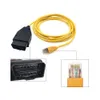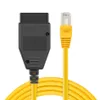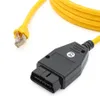ENET cables provide high-speed data transfer capabilities, precision, and accuracy, making them a reliable option for Ethernet cable consumers. These cables can save time and money by reducing errors and improving diagnostic results. ENET cables are compatible with various BMW F-Series vehicles, saving the cost of purchasing multiple cables for different models of BMWs. The ease of installation is an added advantage. Technical specifications include aspects such as speed, compatibility, and durability, reassuring potential buyers of their quality. Overall, ENET cables are an efficient option for Ethernet cable users who require a reliable and compatible cable for their BMW F-Series vehicle.








Benefits of ENET Cables
ENET cables are designed to provide a seamless connection between devices, allowing for lightning-fast data transfer rates that can reach up to 10 gigabits per second. This high-speed capability allows users to transfer large files, stream HD videos, and carry out other bandwidth-intensive tasks with ease. The result is a more efficient workflow that saves time and increases productivity.
In addition to speed, ENET cables also offer unparalleled precision and accuracy. Their unique design ensures that data is transmitted accurately and without any loss of information, making them ideal for applications that require high levels of precision, such as medical equipment and scientific instruments. This level of accuracy also helps reduce errors and improve diagnostic results, which is critical in fields such as healthcare and research.
Another significant advantage of using ENET cables is their reliability. Unlike wireless connections, which can be affected by interference and signal loss, wired connections are much more stable and less prone to disruptions. This means that businesses and individuals can rely on ENET cables to provide a consistent and dependable connection, reducing downtime and improving overall efficiency.
Finally, ENET cables are also cost-effective. While they may cost more upfront than other options, such as Wi-Fi or Bluetooth, their durability and reliability mean that they last much longer and require minimal maintenance. This translates into long-term savings for businesses and individuals alike.
Compatibility
Compatibility is the foremost concern when it comes to choosing an ENET cable for your BMW. The good news is that these cables are generally compatible with most F-Series vehicles produced after 2011. This includes popular models like the 3 Series, 5 Series, 7 Series, X3, X5, and X6. It’s important to note, however, that compatibility may vary depending on the specific model year, engine type, and software version of your BMW. To ensure proper compatibility, it’s best to consult with the manufacturer or seller before making a purchase.
One of the key advantages of ENET cables is their ease of installation. Unlike traditional OBD-II scanners, ENET cables do not require special adapters or software to work. All you need is a laptop and the appropriate coding software, such as BimmerCode or Carly. Simply plug the ENET cable into the OBD-II port located under the dashboard of your BMW, connect it to your laptop, and you’re ready to go! This simple process can save you time and money compared to more complex diagnostic tools that require professional installation and programming.
Another significant advantage of ENET cables is their ability to work with multiple BMW models. Instead of buying separate cables for each model you own or work on, you can simply plug in your ENET cable and start diagnosing or coding. This saves you money in the long run and allows you to work more efficiently without having to worry about compatibility issues between different cables.
Technical Specifications
First and foremost, let’s talk about speed. ENET cables come in various categories, each offering different speeds and performance levels. The most common categories are Cat5e, Cat6, and Cat6a. Cat5e cables support speeds of up to 1 gigabit per second (Gbps), making them suitable for most home and small office setups. On the other hand, Cat6 cables can handle up to 10 Gbps, providing faster and more reliable connections for larger networks. Lastly, Cat6a cables are designed for even higher speeds, supporting up to 10 Gbps over longer distances. By understanding the speed capabilities of ENET cables, consumers can choose the right category that best suits their networking needs.
Compatibility is another important aspect of ENET cables. These cables are universally compatible with a wide range of devices, including computers, routers, switches, and other networking equipment. They are also backward compatible, meaning that newer cables can work with older devices and vice versa. This flexibility ensures that ENET cables can be seamlessly integrated into existing network infrastructures without any compatibility issues.
Durability is a key factor to consider when evaluating the quality of ENET cables. These cables are built to last, featuring sturdy connectors and high-quality insulation materials that protect against wear and tear. Additionally, many ENET cables are designed to meet industry standards for environmental resistance, such as being able to withstand extreme temperatures and exposure to moisture. This robust construction ensures that ENET cables can maintain reliable connectivity even in challenging conditions, making them a dependable choice for both indoor and outdoor use.
In conclusion, ENET cables offer a range of technical specifications that cater to the diverse needs of consumers. From speed and compatibility to durability, these cables are designed to deliver high-performance networking solutions for various applications. By understanding the technical specifications of ENET cables, consumers can confidently select the right cables for their specific requirements, whether it’s for home networking, business operations, or industrial environments. With their proven track record of reliability and performance, ENET cables continue to be a top choice for discerning consumers who demand excellence in their network connectivity.
FAQ
Q: What is an ENET cable?
A: An ENET cable is a diagnostic tool used for programming and coding BMW F-Series vehicles. It is a specialized cable that connects to the OBD-II port of your vehicle and allows you to access and modify various settings within the car’s computer system.
Q: Why should I use an ENET cable for my BMW F-Series vehicle?
A: An ENET cable provides precise data transfer, meaning you can trust that the information being transmitted between your vehicle and your computer is accurate and reliable. This is especially important when it comes to making modifications or adjustments to your car’s computer system, as any errors could potentially cause serious damage to your vehicle.
Q: Do I need any special software or equipment to use an ENET cable?
A: Yes, you will need a laptop or computer with the appropriate software installed in order to use an ENET cable. There are a variety of different software programs available for BMW programming and coding, so it’s important to do your research and choose one that suits your needs.
Q: Is using an ENET cable legal?
A: Yes, using an ENET cable to program and code your BMW F-Series vehicle is completely legal. However, it is important to note that any modifications you make to your vehicle’s computer system may void your warranty, so be sure to keep this in mind before making any changes. Additionally, it is always recommended to consult with a professional mechanic or technician before attempting to make any modifications to your vehicle.